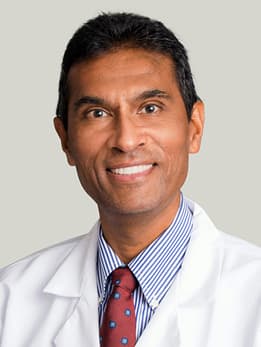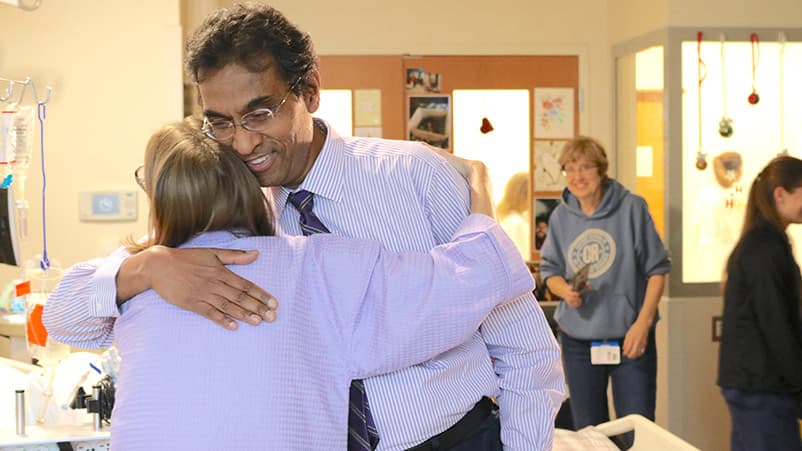
Valluvan Jeevanandam, MD
Valluvan Jeevanandam, MD
Cynthia Chow Professor of Surgery
Director, Heart and Vascular Center
Specialties
- Cardiac Surgery (Heart Surgery)
- Surgery
- Transplant
Locations
- Chicago - Hyde Park
- About
- Specialties & Areas of Expertise
- Locations & Patient Information
- Education & Research
- Accepted Insurance
- External Professional Relationships
Meet Dr. Jeevanandam
Valluvan Jeevanandam, MD, specializes in the surgical management of heart failure, and is an expert in high-risk and transfusion-free (bloodless) cardiac surgery. He has performed over 1,500 heart transplants and is recognized as the world’s most experienced active heart transplant surgeon. Under his leadership, UChicago Medicine’s heart transplant program achieved status as the world’s premier program with best survival rate and shortest wait times. His team takes on the most difficult cases and Dr. Jeevanandam was one of the physician leaders of the care team that made history in December 2018 after performing two triple-organ transplants within 27 hours, replacing the failing hearts, livers and kidneys of two 29-year-old patients. There have only been 42 such procedures performed in the world, and he has completed the heart transplant operation for all 17 done at UChicago Medicine.
He is also a pioneer in the field of mechanical circulatory support (MCS). Throughout his career, Dr. Jeevanandam has participated in the development, regulation and investigation of many of MCS devices. He has performed several first-in-human device operations (NuPulse iVAS, CardioVAD), and has implanted roughly 500 durable LVADs.
He has a special interest in treating patients that are traditionally considered inoperable. Dr. Jeevanandam has reconstructed damaged hearts in many patients awaiting transplant, enabling those patients to live with their own hearts. A trailblazer in bloodless cardiac surgery, Dr. Jeevanandam is sought out by patients from all over the world for procedures he performs without blood, including CABG, valve and aortic surgery. He is one of the few surgeons globally to offer patients bloodless heart transplantation and advanced MCS therapy options. Dr. Jeevanandam is extremely proud of the team he has helped build that cares for these highly complex patients and delivers outstanding outcomes for cardiac surgery.
Outside of his clinical practice, Dr. Jeevanandam is a highly active researcher, having published over 250 articles in leading journals, which have been cited over 10,000 times. He has participated in countless abstract and presentations at conferences across the globe. Dr. Jeevanandam travels annually to the Middle East and Asia on medical missions, volunteering his time to operate and teach local physicians the most advanced techniques and protocols he has developed over his own career so that the highest quality of care can be brought to patients wherever they reside.
Areas of Expertise
- Ventricular Assist Devices (VADs)
- Heart Transplant
- Valvuloplasty
- Heart Failure
- Artificial Hearts
- Valve Disease
- Minimally Invasive Cardiac Surgery
- Bloodless Heart Surgery
Board Certifications
- Thoracic Surgery
Practicing Since
- 1985
Languages Spoken
- English
- Tamil
Medical Education
- Columbia University College of Physicians and Surgeons
Residency
- NewYork-Presbyterian Hospital
Fellowship
- Columbia College of Physicians and Surgeons; University of Pennsylvania
Memberships & Medical Societies
- American Association for Thoracic Surgery
- Society of Thoracic Surgeons
- American College of Surgeons
- American Heart Association
News & Research
Insurance
- Aetna Better Health *see insurance page
- Aetna HMO (specialists only)
- Aetna Medicare Advantage HMO & PPO
- Aetna POS
- Aetna PPO
- BCBS Blue Precision HMO (specialists only)
- BCBS HMO (HMOI) (specialists only)
- BCBS Medicare Advantage HMO & PPO
- BCBS PPO
- Cigna HMO
- Cigna POS
- Cigna PPO
- CountyCare *see insurance page
- Humana Medicare Advantage Choice PPO
- Humana Medicare Advantage Gold Choice PFFS
- Humana Medicare Advantage Gold Plus HMO
- Medicare
- Multiplan PPO
- PHCS PPO
- United Choice Plus POS/PPO
- United Choice HMO (specialists only)
- United Options (PPO)
- United Select (HMO & EPO) (specialists only)
- United W500 Emergent Wrap
- University of Chicago Health Plan (UCHP)
Our list of accepted insurance providers is subject to change at any time. You should contact your insurance company to confirm UChicago Medicine participates in their network before scheduling your appointment. If you have questions regarding your insurance benefits at UChicago Medicine, please contact our financial counseling team at OPSFinancialCounseling@uchospitals.edu.
Some of our physicians and health professionals collaborate with external pharmaceutical, medical device, or other medical related entities to develop new treatments and products to improve clinical outcomes for patients. In some instances, the physician has ownership interests in the external entity and/or is compensated for advising or speaking about the entity’s products or treatments. These payments may include compensation for consulting and speaking engagements, equity, and/or royalties for products invented by our physicians. To assure objectivity and integrity in patient care, UChicago Medicine requires all physicians and health professionals to report their relationships and financial interests with external entities on an annual basis. This information is used to review relationships and transactions that might give rise to potential financial conflicts of interest, and when considered to be significant a management plan to mitigate any biases is created.
If you are a patient at UChicago Medicine and would like more information about your physician’s external relationships, please talk with your physician. You may also visit the Centers for Medicare & Medicaid Services (CMS) Open Payments website at https://openpaymentsdata.cms.gov/ . CMS Open Payments is a national disclosure program that promotes a more transparent and accountable health care system. It houses a publicly accessible database of payments that reporting entities, including drug and medical device companies, make to covered recipients like physicians and hospitals.
Information in the CMS Open Payments database could potentially contain inaccurately reported and out of date payment information. All information is open to personal interpretation, if there are questions about the data, patients and their advocates should speak directly to their health care provider for a better understanding.
Ratings & Reviews (27)
4.8/5 353 RatingsHelping Patients No Other Doctors Can Save
Dr. Valluvan Jeevanandam, the cardiac surgeon behind several historic organ transplant milestones at UChicago Medicine, is shaped by his spirituality and a relentless drive to help patients.

One Year Anniversary of Historic Back-to-Back Triple Transplants
UChicago Medicine physicians made history after performing two triple-organ transplants within 27 hours, replacing the failing hearts, livers and kidneys of then-29-year-olds Sarah McPharlin and Daru Smith. They join us with their doctors to reflect.
UChicago Medicine performs historic back-to-back triple-organ transplants
Two 29-year-old patients from Michigan and Illinois received back-to-back triple-organ transplants to replace their failing hearts, livers and kidneys. The two surgeries lasted more than 17 and 20 hours each. This marked the first time a U.S. hospital has ever performed more than one of these complex procedures within one year, much less within 27 hours.

